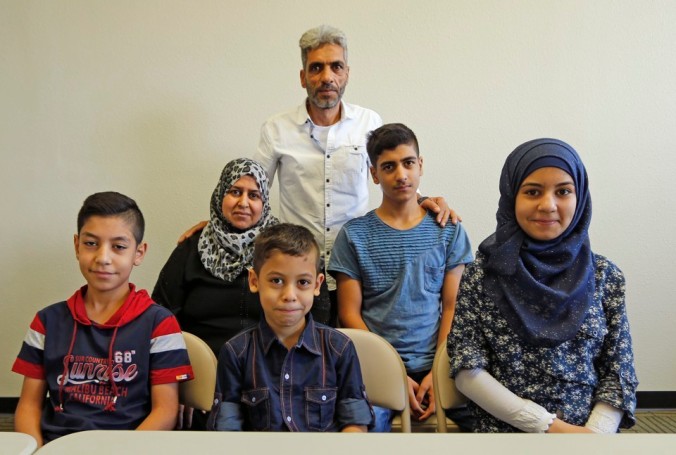 Let me address those celebrating President Donald Trump’s executive order barring refugees from Syria and other predominantly Muslim countries.
Let me address those celebrating President Donald Trump’s executive order barring refugees from Syria and other predominantly Muslim countries.
Let me address those who think keeping out Muslim refugees has somehow made us safer. That it has somehow made America better. That it has somehow shown us to be strong.
You are wrong. Woefully, embarrassingly, pathetically wrong.
As Trump signed the order Friday — with Vice President Mike Pence and Defense Secretary James Mattis, two men who had previously denounced such an order, standing at his side, complicit — the terrorists won. The Islamic State militant group won.
This is exactly what they wanted. For us to defy who we are, who we’ve always been.
They can claim victory for getting us to bend to their will, not due to force, but due to fear. Baseless, unfounded fear. Fear that is not becoming of most Americans I know. Fear ginned up for purely political purposes. Fear that will now cost innocent children, women and men their lives and any chance at a future. Fear that will embolden our enemies and help drive up their numbers as the evil portrait they paint of us — as a Western power at war with Islam — is confirmed in some young minds.
Chicago advocates condemn Trump’s order on refugees, migrants
Chicago advocates condemn Trump’s order on refugees, migrants
Part of who we are went away as that order was signed. And we are not better for it — not at all.
We don’t look strong. We look cowardly.
And each and every person out there celebrating this decision, you don’t look tough. You don’t look patriotic. You look ignorant. And weak. Because you have turned your back on people in need.
You who are Christians have gone against everything Jesus taught. Everything.
FULL ARTICLE FROM THE CHICAGO TRIBUNE
 As controversy rages about President Donald Trump’s travel ban, critics have pointed out that the seven predominantly Muslim countries whose citizens have been barred have one thing in common – they are not among the places where the tycoon does business.
As controversy rages about President Donald Trump’s travel ban, critics have pointed out that the seven predominantly Muslim countries whose citizens have been barred have one thing in common – they are not among the places where the tycoon does business. Hameed Darweesh aided U.S. armed forces in Iraq as a translator and electrical engineer for over a decade. For obvious reasons, that put his life at risk. After his home was raided by Baghdad police and two of his colleagues were murdered at work, he and his family fled to another part of Iraq, according to court documents. Darweesh and his family then had to flee their new town when a shopkeeper informed him men driving around in a BMW were asking for him and wanted to know where he lived.
Hameed Darweesh aided U.S. armed forces in Iraq as a translator and electrical engineer for over a decade. For obvious reasons, that put his life at risk. After his home was raided by Baghdad police and two of his colleagues were murdered at work, he and his family fled to another part of Iraq, according to court documents. Darweesh and his family then had to flee their new town when a shopkeeper informed him men driving around in a BMW were asking for him and wanted to know where he lived. President Trump’s telling, the Middle East is a place where Christians run a daily gantlet of persecution, threatened at every corner by religious zealots eager to chop off their heads.
President Trump’s telling, the Middle East is a place where Christians run a daily gantlet of persecution, threatened at every corner by religious zealots eager to chop off their heads. Let me address those celebrating President Donald Trump’s executive order barring refugees from Syria and other predominantly Muslim countries.
Let me address those celebrating President Donald Trump’s executive order barring refugees from Syria and other predominantly Muslim countries. President Trump has signed an executive order that temporarily
President Trump has signed an executive order that temporarily 
 Eradicating “radical Islamic terrorism” from the face of the earth has been President Trump’s mantra, first in the campaign, then in his Inaugural Address and remarks a day later to the C.I.A.
Eradicating “radical Islamic terrorism” from the face of the earth has been President Trump’s mantra, first in the campaign, then in his Inaugural Address and remarks a day later to the C.I.A. President Trump is expected to announce a ban on Muslim immigrants into the United States. However, polls conducted in the last year show that, despite his electoral success, Trump’s views on Islam and Muslims do not have wide support among the American public.
President Trump is expected to announce a ban on Muslim immigrants into the United States. However, polls conducted in the last year show that, despite his electoral success, Trump’s views on Islam and Muslims do not have wide support among the American public.
 The new head of the CIA is a dangerous Christian extremist who believes the U.S. is at war with Islam.
The new head of the CIA is a dangerous Christian extremist who believes the U.S. is at war with Islam.